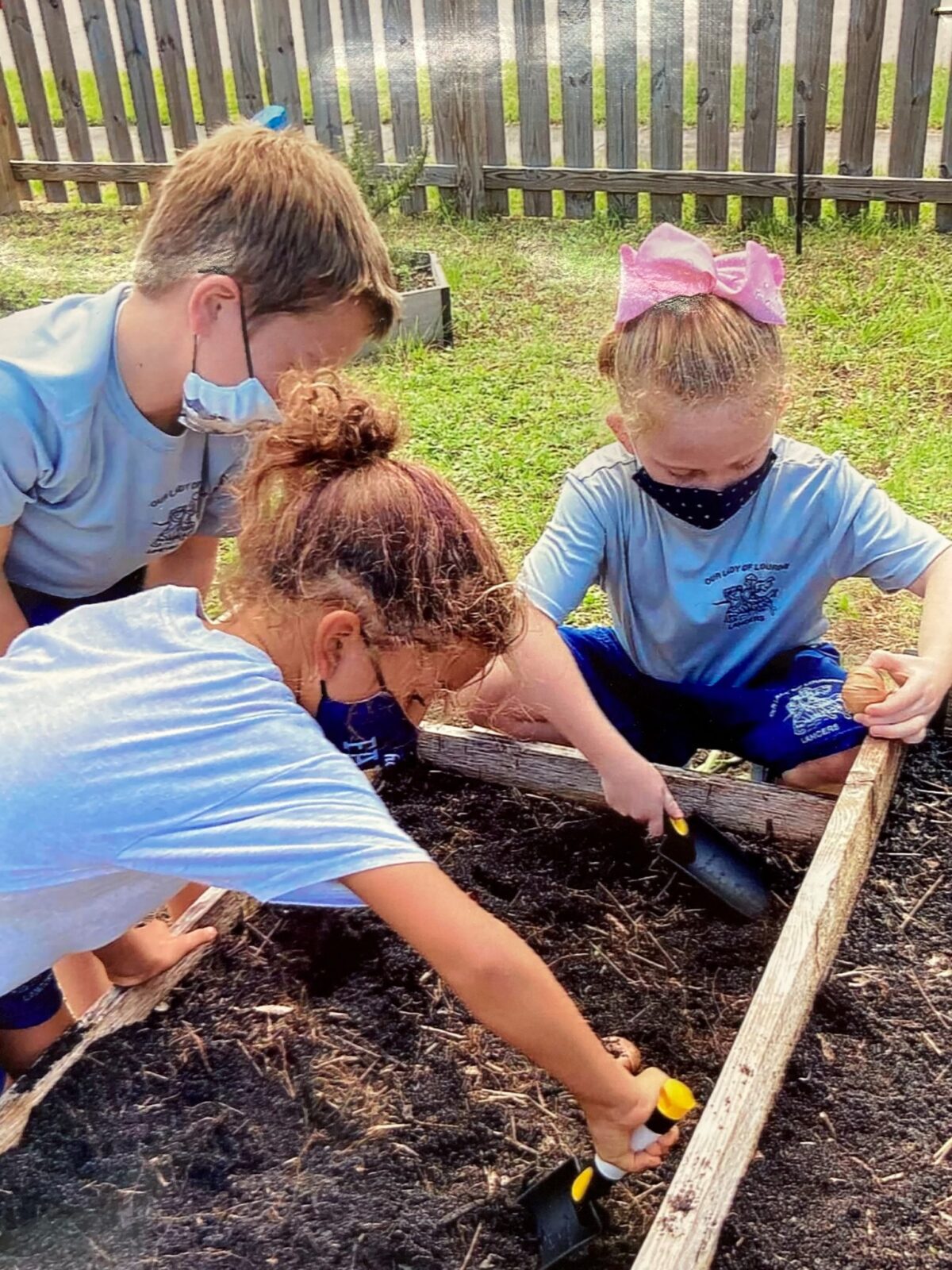MELBOURNE | Our Lady of Lourdes Catholic School in Melbourne is the first school in the Diocese of Orlando to receive STREAM (Science, Technology, Religion, Engineering, Arts, and Math) accreditation from the Florida Catholic Conference (FCC). The school officially earned accreditation in October, but has been practicing the STREAM method for some time.
Henry Fortier, superintendent of Catholic Schools explained, STREAM does not occur in isolation. It is a cross-curricular experience imbued into campus life and academics, which incorporates religion and the arts. He and the other six superintendents of Catholic schools throughout the state worked with the FCC to outline STREAM accreditation requirements. “We wanted it to be something rigorous to achieve so it would be something of value,” he said. “The beauty of STREAM is that it applies Catholic teaching to every area of academic life. Rather than simply studying an aspect of technology or engineering, STREAM schools also take into account the implications of those sciences in the real world, viewing them through a moral, Catholic lens, assuring they best serve and honor the dignity God’s creation, entrusted to our care.”
To be considered a “STREAM School” the school scores an average of 3.0-3.49 composite on FCC benchmarks, STREAM benchmarks, and the observations. Joseph Belinski, the diocese’s school planning director stated, “Our Lady of Lourdes had among the best scores I have seen in more than 10 years of working on accreditation. Not only did the school achieve STREAM certification, but Our Lady of Lourdes also had 8 scores raised from a 3 to a 4, spread among the Domains of Mission and Catholic Identity, Governance and Leadership, and Academic Excellence.”
Principal Donna Witherspoon began pursuing accreditation roughly two years ago. Being on the Space Coast and knowing how much science, technology, engineering and math the school fostered, Witherspoon thought it was an excellent opportunity. With a campus set up for collaboration and thinking skills needed in the engineering process, Witherspoon said, “It wasn’t very hard to fine tune things and take them to the next level.”
She quickly enlisted the help of longtime colleague Rebecca Booth, science teacher and STREAM Coordinator. Booth and her team assembled a lesson plan to make that “full connection across the curriculum.” Their desire was not to have “students learning in subject silos, but to have a full blended learning experience across as many subjects as possible,” she said.
The school boasts an Innovations Lab, Science Lab, Engineering Lab, and garden classroom that includes an aquaponics garden fertilized by tilapia, a hydroponic and community garden. A multi-space fine arts room and a parish hall facilitate “all modalities of learning”.
The STREAM model is a success in part because of Witherspoon’s willingness to give teachers creative freedom. “For our community, the hands-on approach, the thinking process behind STREAM – the problem solving, the rationale, the reasoning, the investigation – is crucial and our population really thrives with it.” The garden classroom stands on a lot the size of a house. Each class is assigned a vegetable. Flowers and herbs flourish in and around a 4’ x 8’ planter bed near broccoli, carrots, and Brussels sprouts. Flowers grown are often altar decorations at Mass and food is frequently donated to the parish community. “We provide for others with what we’ve grown,” Witherspoon said. “The gardens are full of religious symbols including a dedication to Mary, the school’s patroness.”
Third grade’s culminating project was a hamster habitat to observe requirements for survival. Students researched the topic; learned what was necessary for life; and explored the importance of being a “good steward.” Dimensions for the habitat provided mathematical challenges. Students used recycled items from other projects demonstrating care for creation.
Planning projects has changed during the pandemic, but Booth emphasized STREAM curriculum is “living”- constantly evolving. All plans this year say “COVID” on them to indicate the exceptionality of the year. “It’s an acknowledgement” of the efforts to make great experiences despite the circumstances, she says. Witherspoon credits her teachers with using Zoom to guide students learning from home. They even take virtual tours of the garden to monitor the progress, distinguish weeds from plants, and make assessments.
Booth and the Our Lady of Lourdes staff do everything possible to personalize learning and experiences. For the celebration of Mass, Booth Zoom’s her only student not on campus and makes sure the deacon gives a blessing. “They’re participating in the Mass with us,” she said. “I want them to have that blessing too.”
For Witherspoon, the whole process “has made learning more engaging.” She noted, “Sometimes they forget they’re learning… It’s bringing out the best each child has to offer,” fulfilling part of the school’s mission statement.
At this time, Resurrection Catholic School in Lakeland is working toward STREAM accreditation. Superintendent Fortier noted, “It is what all Catholic schools strive for.”
By Glenda Meekins of the Florida Catholic, February 03, 2021

